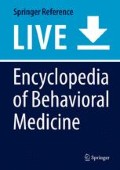References and Further Reading
Bandura, A. (1997). Self-efficacy: The exercise of control. New York: Freeman.
Heider, F. (1958). The psychology of interpersonal relations. New York: Wiley.
Jones, E. E., Kanouse, D. E., Kelley, H. H., Nisbett, R. E., Valins, S., & Weiner, B. (Eds.). (1972). Attribution: Perceiving the causes of behavior. Morristown: General Learning Press.
Nickel, D., & Spink, K. S. (2010). Attributions and self-regulatory efficacy for health-related physical activity. Journal of Health Psychology, 15, 53–63.
Nickel, D., Spink, K. S., Andersen, M., & Knox, K. (2014). Attributions and self-efficacy for physical activity in multiple sclerosis. Psychology, Health & Medicine, 19, 433–441.
Roesch, S. C., & Weiner, B. (2001). A meta-analytic review of coping with illness: Do causal attributions matter? Journal of Psychosomatic Research, 50, 205–219.
Sarkisian, C. A., Prohaska, T. R., Davis, C., & Weiner, B. (2009). Pilot test of an attributional retraining intervention to raise walking levels in sedentary older adults. Journal of the American Geriatrics Society, 55, 1842–1846.
Spink, K. S., & Nickel, D. (2010). Self-regulatory efficacy as a mediator between attributions and intention for health-related physical activity. Journal of Health Psychology, 15, 75–84.
Spink, K. S., Brawley, L. R., & Gyurcsik, N. G. (2016). Perceived success/failure and attributions predict self-regulatory efficacy to meet physical activity recommendations for women with arthritis. Women & Health, 56, 767–783.
Weiner, B. (1986). An attributional theory of motivation and emotion. New York: Springer.
Weiner, B. (2008). Reflections on the history of attribution theory and research: People, personalities, publications, problems. Social Psychology, 39, 151–156.
Weiner, B. (2010). The development of an attribution-based theory of motivation: A history of ideas. Educational Psychologist, 45, 28–36.
Author information
Authors and Affiliations
Corresponding author
Editor information
Editors and Affiliations
Section Editor information
Rights and permissions
Copyright information
© 2019 Springer Science+Business Media, LLC, part of Springer Nature
About this entry
Cite this entry
Spink, K.S., Nickel, D. (2019). Attribution Theory. In: Gellman, M. (eds) Encyclopedia of Behavioral Medicine. Springer, New York, NY. https://doi.org/10.1007/978-1-4614-6439-6_298-3
Download citation
DOI: https://doi.org/10.1007/978-1-4614-6439-6_298-3
Received:
Accepted:
Published:
Publisher Name: Springer, New York, NY
Print ISBN: 978-1-4614-6439-6
Online ISBN: 978-1-4614-6439-6
eBook Packages: Springer Reference MedicineReference Module Medicine
Publish with us
Chapter history
-
Latest
Attribution Theory- Published:
- 14 November 2018
DOI: https://doi.org/10.1007/978-1-4614-6439-6_298-3
-
Original
Attribution Theory- Published:
- 23 September 2016
DOI: https://doi.org/10.1007/978-1-4614-6439-6_298-2

